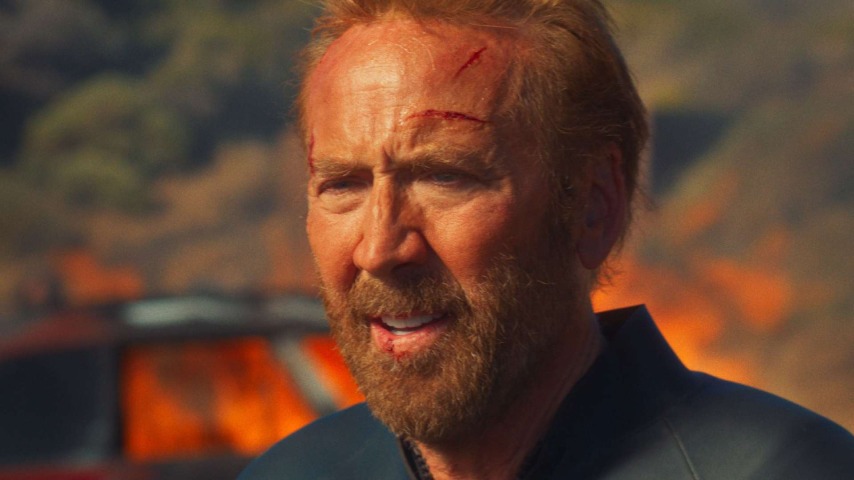Films starring Nicolas Cage after his late 2010s career resurgence broadly fall into one of two categories: “five-alarm freakout” and “hard truths.” If one sits down with a present-day Cage movie, the odds favor him falling into the throes of acute histrionics, or performing wistful regret accompanied by soul-stirring wisdom. That’s his biome, more or less, limited by climate but so vast that his rangings rarely follow the same trail twice. Lorcan Finnegan’s The Surfer is a confluence of Cage’s contemporary work: grounded by loss, nostalgia, and old misgivings, like Michael Sarnoski’s Pig, but drifting about on a cloud of surreality, like Panos Cosmatos’ Mandy or Kristoffer Borgli’s Dream Scenario.
The Surfer is a yes-and exercise, where one starts out questioning how much of what is on screen is actually there, and over time stops caring enough to ask, because whether or not the world, as seen through the eyes of the surfer (Cage’s anonymous protagonist), is real doesn’t matter. The audience becomes so burrowed in his burgeoning psychosis that the tangibles outside of his head become window dressing for his spiral into frustration, disbelief, and eventually madness.
Cage plays a man attempting to avert a midlife crisis by nabbing a million-dollar coastal mansion in Australia, his birth nation, smack dab by the beach where he spent his salad days catching waves. Fifty years ago, that might’ve meant something. In The Surfer, it’s just a pathetic callback for the area’s reigning locals, led by Scally (Julian McMahon), a charismatic meathead seemingly rolled off the conveyor belt at the Manosphere factory; the film characterizes him as something of a self-help guru for misfit men, which is a bit like calling Andrew Tate a Romanian import. Scally’s an asshole. His mates are assholes. His following is made up of assholes, too, whether young lads who strive for his blessing and tutelage, vendors serving coffees and snacks to beachgoers, or the cops (represented by Justin Rosniak, best known in the U.S. for Scott Ryan’s FX series Mr. Inbetween).
If the surfer wasn’t such a tragic case of yuppiedom, maybe it’d be easier to hold it against the locals that their approach to hosting foreigners could use some tweaking. But Cage plays the character with a register of annoyance and entitlement. Nearly everybody that he interacts with, he sees as an inconvenience or an asset, at least going by his constitutional impatience for other people. Anyone would find the packs of cackling teenage boys irritating, if not for their standard-issue homophobia then for their lack of originality. But the surfer behaves as if he is owed some measure of deference as a son of the beach, and, more implicitly, as an American. He’s waiting on a Very Important Phone Call from his estate agent (Rahel Romahn) about the mansion, and he expects all in his vicinity to bend in compliance to his needs.
The Surfer isn’t necessarily about the Ugly American stereotype by way of its wiring (though it certainly hints at it, in light of the trade wars currently being fought by the Republican administration as a de facto dick-measuring contest). The film’s desperate hero is the pitiable type, a schlemiel more than a schmuck. But losers come off as jerks when traveling abroad, wearing their Americanness like a suit of armor; the film expresses a fear of visiting foreign or far-flung countries, concurrent with disdain for the people who make those visits under the assumption that guest status is a right instead of a privilege, as if expecting a red carpet be rolled out for them everywhere they go. In this particular context, Finnegan and screenwriter Thomas Martin clue the audience in early that the nameless lead isn’t exactly the forthright or noble sort, casting Scally’s heaping abuses of his pride and dignity as a form of righteous intercontinental punishment for those sins.
It’s not that the movie advocates Scally’s position, or even frames him as a reasonable, empathetic human. It’s that the surfer is enough of a prick in his own right that even if the messenger is grotesque, the message feels nonetheless warranted. The Surfer slowly follows the threads of its hero’s unraveling neuroses, and Cage walks right up to the line of sanity as each strand comes undone. It is a marvelous pushback against expectations that he stays on the other side of that line; the audience anticipates good old-fashioned emotional flare-ups from a living master of theatrical melodrama, and instead, at the last moment, right before what looks like his imminent eruption, he restrains himself—his teeth bared and eyes wild, yes, but nonetheless, restrained.
Cage’s withholding allows Finnegan to let loose in other ways: with Radzek Ladczuk’s camera, for instance, freewheeling and menacing, and with the macho pomp of Scally’s ritualized beachside hangouts, like he and his crew are Lost Boys living in a frathouse called Neverland. It’s a rare moment where what one knows of Cage’s methods as an actor crystallizes into a form that feels wholly unknown—discovering new ground in well-tread territory.
Director: Lorcan Finnegan
Writer: Thomas Martin
Starring: Nicolas Cage, Julian McMahon, Justin Rosniak, Miranda Tapsell
Release Date: May 2, 2025









































